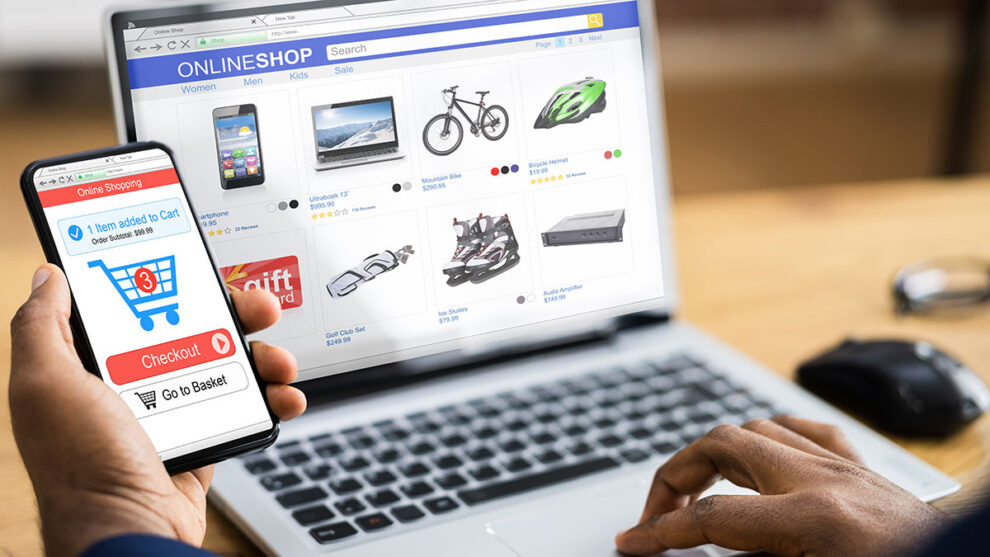For the Kenyans who cannot afford the convenience and cost of weekly shopping trips to shiny retail outlets, digital commerce delivered through dukas and WhatsApp is becoming popular.
As Amazon-type e-commerce—personified in Jumia—flounders, African entrepreneurs are finding ways to sell online that combine how people shop in malls with the convenience of retail corner shops, the shops that dominate grocery and small housewares. E-commerce in East Africa (and elsewhere on the continent) is changing to something that can be argued, closely resembles the dark-store delivery model. The main difference is that instead of hub-and-spoke warehouses serving as fulfilment centres, retail corner shops—dukas, as they are called in Kenya—are not repurposed warehouses. This custom cocktail of digitally-enabled shopper aggregation and fulfilment is gaining currency in neighbourhoods in Nairobi and Nakuru in Kenya, Kampala in Uganda, and Dar es Salam in Tanzania. A handful of companies are the face of this change.
You can do your weekly grocery shopping in any of the Naivas or Quickmart supermarkets in Nairobi or one of the malls that dot the city. But for far too many Kenyans, that is a privilege they cannot afford to depend on for groceries or household staples. The outlets are too few and the items too costly. Naivas, for example, is Kenya’s largest supermarket chain, but there are only 84 outlets throughout the entire country. So street shops fill in the gap. They are especially important in peri-urban neighbourhoods and rural communities, where fancy supermarkets are scant. Once or twice a week, Kenyans will make the trip to the chaotic Wakulima or Muthurwa markets where the food is fresh and prices are cheap.
Despite growth in mobile phone and internet users, and an increase in the number of people using formal financial services, early online shopping ventures cast in the mould of Amazon have fallen flat. More than any, Jumia’s ongoing struggle to establish itself as Africa’s online retail market made it clear to investors and entrepreneurs that replicating Amazon’s online success (itself waning) in Africa is a costly undertaking. And in the last three years, African e-commerce companies (and investors) decidedly turned towards competing with (some say complimenting) the middlemen who sell to street retailers.
This B2B e-commerce model, led by the likes of TradeDepot, Sabi and Omnibiz in Nigeria, Wasoko (formerly Sokowatch), Twiga and Shop Topup in East Africa, and Jabu in Southern Africa, has become the darling venture capitalists who invest in African e-commerce. In 2021, B2B e-commerce firms raised more than $256 million in disclosed funding. Last year also saw considerable sums invested in B2B e-commerce.
B2B e-commerce companies seek to digitise the distribution layer of the fast-moving consumer goods business, which makes up the bulk of items bought in street shops. They also provide credit to keep their retail partners’ stock high. “Our success is when they are able to offer more goods and at better prices,” explained Tridiv Vasavada, Wasoko’s chief technology officer.
Will B2B ecommerce capture Africa’s informal markets?
Another set of entrepreneurs are tackling digital shopping differently. Instead of giving up on last-mile e-commerce, they are co-opting street shops as both ordering points and delivery points in order to get goods to last-mile shoppers. Copia Global, Tushop, which combines social buying with retail aggregation, and more recently, Kapu are some of the startups leading with this style of buying goods online.
In the final decades of the 19th century, rural America was growing resentful of middlemen, especially storekeepers who they felt charged too much. A travelling salesman was quick to catch on to the growing sentiment and quickly formed a company in 1872 that mailed product catalogues to shoppers in rural America. Aaron Ward’s company, Montgomery Ward & Company, was quickly followed by Sears, Roebuck & Company, making mail-order catalogues the primary retail channel outside of big towns. By offering goods found in the shiny department stores in the commercial districts of America’s fast-growing cities, mail-order catalogues brought rural America and cities together and foreshadowed modern e-commerce. Mail-order companies could aggregate sales weekly and plan to ship accordingly. And in the beginning, customers picked up deliveries at local stores or post offices—before US rail reforms made rural doorstep delivery possible.
Retail commerce aggregation works in a similar fashion—without the trains. In brief, companies use modified consumers-to-manufacturer (C2M) models to generate demand that cuts out a significant part of traditional distribution channels, allowing them to sell directly to consumers at lower prices. Because they are not selling to an individual customer, but to groups of customers, they have denser orders to fulfil per location and can better manage their logistics operations.
E-commerce in Africa is increasingly embracing this model of digitally-mediated selling. Copia is one example.
Where Jumia chose to focus on serving the narrow middle class who want the convenience of shopping online, Copia which was founded in the same year as Jumia, choose to focus on the lesser-earning but a significantly larger market of Kenyans who want affordable products and household staples—especially people who do not live in urban areas where they can easily shop in large malls or retail outlets.
After 10 years, Jumia is more than an eCommerce company
Agent network Costco
Copia says it passes on reduced prices from its vendor deals to customers and the online retail company is creating its line of branded products, in much the same way Costco, the American retail giant makes and sells cheap hotdogs, rotisserie chicken and Kirkland Signature consumer staples. “We’re huge admirers of the Costco model mainly because it passes on the benefits of scale and the benefits of quality to the consumer. And I think that’s something that we are determined to continue to do,” Tim Steel, Copia’s chief executive tells TechCabal.
The firm now sells Copia-branded sugar and rice and in August 2022, Copia opened a second packaging facility that doubled its capacity to meet demand which the company says is rising. Unlike Costco, however, Copia does not build large warehouse-style outlets, relying instead on hand-picked duka owners who make up Copia’s roughly 40,000-strong agent network.
Kapu, founded by Sam Chappatte, a former Kenya country head for Jumia early in 2022, has chosen the same route, with a twist. It allows groups of shoppers to place bulk orders for groceries together. The costs are then split between the buyers. This model combines the B2C agent model used by Copia (and Egypt’s Brimore) with the social bulk buying model of Nigeria’s Pricepally.
Kapu mainly stocks foodstuffs and other essential goods used in a typical Kenyan household. “What we try to do with our model is to mimic, as close as possible, how our customers behave offline,” Chappatte explains. Like everyone else, Kapu’s agents are street retailers who receive a commission for products they help consumers order. But the company hopes to build a chain of affordable fresh produce stores à la Hema Fresh, Alibaba’s new retail concept, which combines traditional shopping with a digital experience. Hema Fresh operates, more or less, like Getir dark stores, with the difference being that customers pick up orders in person, cutting out last-mile delivery costs.
“I think over time we’ll start to have stock and our agents will become convenience stores and we will start to have this blended online-offline model,” Chappatte says. “Overall there is an opportunity for us and [Kapu’s agents] to have access to a much bigger range of products without needing to lock their working capital.”
Tushop, founded in 2021 by Cathy Chepkemboi, is Kapu’s most direct competition. All three companies depend on agents—usually trusted street retailers—to physically collect and fulfil orders.
Tushop takes orders via WhatsApp (Kapu plans to roll out this feature) and their mobile apps. And Copia allows customers to order online, and place orders through its mobile app and USSD shortcodes. In December 2022, Kapu announced $8 million in seed investment. Tushop disclosed $3 million in pre-seed funding, and Copia has raised $103 million since 2012, according to data from business intelligence firm, Crunchbase.
African e-commerce companies, like Kapu, Copia and Tushop, whose business models involve selling directly to consumers through small shopkeepers who act as ordering and collection agents are digital replicas of the earliest forms of the mail-order businesses. But the most recent retail aggregation/social commerce example is Pinduoduo, the Chinese social buying app.
Hybrid “chama” commerce
Like Copia, Pinduoduo targets consumers in lower-tier cities and rural areas. Unlike Copia, but like Tushop and Kapu, Pinduoduo’s marketplace app allows buyers to share products on third-party social networks such as WeChat where friends, family, or neighbours form buying groups where the costs are split between each member. Individuals can shop but at higher prices compared to bulk buying shopping “teams”, and orders are shipped in two days.
Where Pinduoduo differs from Africa’s retail aggregation players, is that it is a marketplace that facilitates a manufacturer-to-consumer model that matches merchants to groups of buyers. Unlike Copia, Kapu and Tushop, it is a capital-light operation as it relies completely on the Pinduoduo app, WeChat, and other third-party social applications to discover customers. As a result, it does maintain a network of retail agents as order and fulfilment points and is not responsible for logistics or warehousing of the inventory merchants sell. The Chinese company also relies on merchandise sales from a separate fresh produce platform Duo Duo Grocery, to connect shoppers directly with farmers in China, Australia and Germany, as well as ad sales to generate revenue.
Social commerce apps like Tushop and Kapu show early promise. But they are weighed down by warehousing and distribution costs that limit their expansion to one area until they have achieved sufficient levels of penetration (in repeat consumer orders and agents) in said location. Both firms are currently vying for dominance in Nairobi.
The upside is: their business model is not entirely new. Kenyan are already familiar with group-shoping and pooling money together to buy items in bulk from wholesalers. When the items arrive (at selected dates) friends will celebrate their haul in “chamas” (house parties where the items are distributed). While this is a familiar concept, it is not how people buy things every other day. But Tushop and Kapu can tap the existing cultural awareness and make the social circle even wider.
Capital-light commerce-enablement apps like Bumpa—a Nigeria subscription service that provides websites and business management tools for micro-entrepreneurs who sell on Instagram and Facebook—do not carry the same operational baggage, but that is because it does not truly function as a marketplace.
On the other hand, retail aggregation shows promise for reaching Africans in rural and peri-urban areas with digital commerce, but increasing levels of internet usage and rural infrastructure may threaten its agent network dependency. The increase in smartphone use “will play a huge role in spearheading a new level of convenience and efficiency in Africa’s $850bn informal retail space,” Wasoko’s Vasavada wrote recently, arguing that this represented a tailwind for Wasoko’s informal B2B business.
But it is a two-edged sword. More smartphone users (who consequently move their spending online) may mean people buying directly from online shops instead of corner stores. This is of course subject to better infrastructure, cheaper data and more Africans who are rich enough to build online shopping habits.
Stephen Deng, co-founder and managing partner of DFS Lab has pointed out that consumer behaviour in Africa, is yet to decisively shift towards digital, which should provide some comfort, but digital adoption in Africa is notoriously unpredictable. All players in this space have to deal with the effect of increased competition, including the risk of their agents reselling or taking orders themselves, and the opportunity for agents to flip between competing platforms to find promotions or the best deals. Exclusivity agreements may prevent this, but may be ineffective against price wars that could invariably arise when multiple agents battle for control of lucrative neighbourhoods.
Source : Tech Cabal















